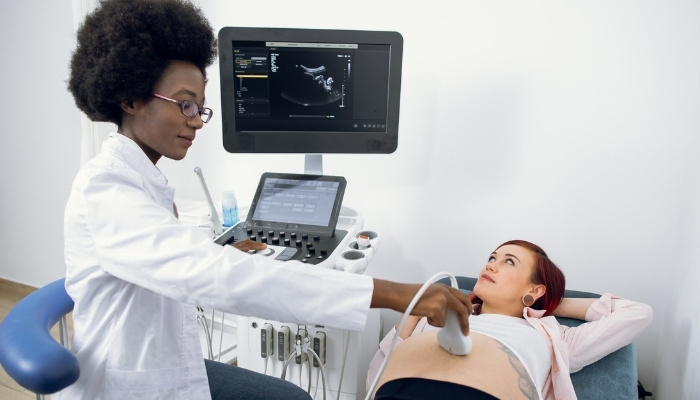There is no need for you to go through severe nausea or have a history of twins in your family to have an inkling that you may be expecting two adorable babies.
At your first prenatal appointment, your doctor will want to test levels of the pregnancy hormone hCG (human Chorionic Gonadotropin) in your blood, and high hCG levels are said to hint at twins, but is this always the case?
Are hCG levels higher with twins? According to physicians, it is estimated that twin pregnancies have hCG levels that are 30% to 50% higher than levels in singleton pregnancies. However, it is not a consistent predictor, since it is also possible to have hCG levels in the “normal” range and still have twins.
Sometimes, higher than average hCG levels can point to an underlying problem such as a possible molar or ectopic pregnancy, which is why regular check-ins with your doctor are so essential.
To understand more about hCG levels with twins, we’ll look at all you need to know from the weekly hCG range for singleton versus twin pregnancies, how the hCG hormone is measured, how levels should be rising in a healthy pregnancy, and much more.
HCG Levels for Twins
In an early twin pregnancy, your hCG levels may read differently than expected, but an ultrasound scan is the surest predictor.
Let’s look at hCG levels in greater detail from what high hCG levels mean to how levels are supposed to rise in a healthy pregnancy, starting with an explanation of what we mean by hCG levels.
Understanding HCG Levels
The hCG (human Chorionic Gonadotropin) hormone is produced by cells in the placenta once the egg (or eggs) has been fertilized and has attached itself to the uterine wall.
This hCG hormone essentially signals to your body that you are now pregnant, and a blood test can detect hCG in your body as early as 10 days after conception.
In a healthy pregnancy, these hCG levels increase with your gestation, so doctors use and monitor hCG trends to help determine how far along you are in pregnancy as well as the health of the baby or babies.
The more babies you are carrying, the more your body will produce the hCG hormone, so hCG testing may, in some cases, hint at whether you can expect a singleton or twin pregnancy.
As hCG testing is not always 100% accurate, however, this is only one indicator of your pregnancy outcome.
How Is HCG Measured?
Levels of the hCG hormone are measured in milli-international units per milliliter written as mIU/mL and can be detected in the blood or urine, with the latter being the less accurate.
A (qualitative) urine test, for example, can merely tell you whether your sample is positive or negative for hCG, while a (quantitative) blood test can detect the actual amount of hCG present.
What Is a Beta HCG Test?
A beta hCG test is simply shorthand for the blood test that looks for hCG in early pregnancy, sometimes called a quantitative blood pregnancy test or a quantitative serial beta-hCG test.
Your doctor will perform this hCG test by taking a sample of blood from a vein.
According to the American Pregnancy Association:
“A single reading of hCG levels is not enough information for most diagnoses. When there is a question regarding the health of the pregnancy, multiple testings of hCG done a couple of days apart give a more accurate assessment.”
How Are HCG Levels Supposed To Rise?
According to fertility experts at Healthline and Very Well Family, the mother’s hCG levels “typically double every 2 to 3 days” and by 6 weeks, the levels increase at a slower rate “doubling about every 96 hours.”
This is true for about 85% of viable pregnancies, based on this 2012 paper published in the journal Fertility and Sterility.
You can normally expect your hCG levels to stop rising between weeks 8 and 11 of your pregnancy as this is when the hormone tends to peak, but this is merely an estimate as every pregnancy is different and hCG ranges can vary quite wildly as we’ll explain.
HCG Levels in Twin Pregnancy
HCG readings differ significantly from person to person, but Ob/Gyn at Yale Medicine Dr. Deepika Garg shares that “it is estimated that twin pregnancies have about 30% to 50% higher hCG levels than singleton pregnancies at the same time in early pregnancy.”
Is HCG Always Higher With Twins?
There are two placentas with some twin pregnancies, so a higher reading of hCG can often be the result. This isn’t true in every case, however.
As Katerina Shkodzik, Ob-Gyn and medical adviser for fertility tracking innovators Mira Care points out, “it is still possible to have twins even if your hCG levels are within the ‘normal’ range for a single pregnancy.”
To make things confusing, there is a wide range of normal levels, so having high hCG levels alone is not enough of a true indicator (if at all) of a twin pregnancy.
Can You Have High HCG Levels and Not Have Twins?
Yes, it is possible for you to have a high initial hCG result with a singleton pregnancy.
Labor and delivery nurse Katie Koss of InVia Fertility shares:
“The range for singletons is 5-397 (mIU/mL), and for twins, it is 48-683. As you can see, there is a big overlap between the first hCG level in singletons and twins. What this means is that even if you had a first hCG level of 397 mIU/mL, it could be a singleton pregnancy.”
Though uncommon, higher than normal hCG levels can sometimes indicate a complication in pregnancy such as ectopic pregnancy, molar pregnancy, or in very rare cases, an hCG-producing tumor (choriocarcinoma).
HCG Levels Week by Week
hCG levels can be charted week by week with each week in the table below representing the number of weeks of pregnancy after a woman’s LMP (last menstrual period).
Your doctor often monitors your hCG levels quite closely in the first trimester to make sure that levels are doubling on schedule, but they will pay greater attention to trends rather than numbers due to the fact there is such a wide range of what is considered “normal.”
As long as your hCG levels are rising, it’s a good sign your pregnancy is progressing healthily.
Medical experts at the American Pregnancy Association advise parents to take the following numbers with a pinch of salt as every woman’s hCG levels can rise at a different rate.
Remember that the change in levels (rising before plateauing at around week 11 and falling) is what matters most.
| Weeks of pregnancy after LMP (last menstrual period) | Range of HCG levels (single pregnancy) | Range of HCG levels (twin pregnancy) |
| 3 | 0 to 50 (mIU/mL) | 5 to 120 (mIU/mL) |
| 4 | 5 to 430 (mIU/mL) | 200 to 1,800 (mIU/mL) |
| 5 | 180 – 7,400 (mIU/mL) | 2,400 to 36,000 (mIU/mL) |
| 6 | 1,100 to 56,500 (mIU/mL) | 8,700 to 108,000 (mIU/mL) |
| 7-8 | 7,600 to 230,000 (mIU/mL) | 7,650 to 288,000 (mIU/mL) |
| 9-12 | 25,300 to 290,000 (mIU/mL) | 348,000 to 480,000 (mIU/mL) |
| 13-16 | 14,000 to 243,000 (mIU/mL) | 180,000 to 348,000 (mIU/mL) |
| 17-24 | 4,000 to 165,000 (mIU/mL) | 8,000 to 165,000 (mIU/mL) |
| 25-40 | 3,200 to 90,000 (mIU/mL) | 3,600 to 117,000 (mIU/mL) |
HCG Levels and Twins: What To Expect in Early Pregnancy
As twin pregnancies are comparatively under-researched, there sadly isn’t a lot of information regarding weekly hCG levels for twins.
Based on the data shared by physicians at Mira Care, Healthline, and Endocrine Web, here’s what you can roughly expect your hCG levels to be like in the early weeks of your first trimester of twin pregnancy.
HCG Levels for Twins at 4 Weeks
By the 4-week mark, your hCG levels will have been doubling around every 48 to 72 hours and will normally continue to do so until you hit 6 weeks.
Just know that at this very early stage in pregnancy, hCG levels will generally be quite low (in singleton or twin cases), and a rapid rise may not be detected until the following week.
HCG Levels for Twins at 5 Weeks
By week 5 in a twin pregnancy, you may have noticed your hCG levels jumping quite dramatically as they continue to double every 2 to 3 days, which could look like a 30% or 50% increase compared with week 5 for a singleton pregnancy.
Every woman is different, so this projected rise is only an estimation. Your doctor will let you know if they are concerned about your hormone levels and may test you over a period of days to get a clearer picture.
Speaking of things rising, you may start to feel like you have a physical “bump” due to first trimester-bloat (not yet a true bump for the world to see, but it’s definitely there for you!)
HCG Levels for Twins at 6 Weeks
At 6 weeks, your hCG levels begin to grow more slowly, doubling now every 96 hours instead, which could put you somewhere between 8,000 or over 100,000 mIU/mL.
By this week of your pregnancy, you’ll finally get the confirmation you are hoping for since twins and multiple babies can now, in some form, be detected via ultrasound!
At this early stage, a heartbeat can be visualized and heard, so this can be the next best indication besides high hCG levels.

How To Confirm Twin Pregnancy
HCG levels alone are not accurate enough to distinguish between a singleton and twin pregnancy, so, as mentioned above, the most accurate way of confirming that twins are on the way is with a prenatal ultrasound scan.
Though ultrasounds can be offered as early as 6 weeks, it’s best to have your ultrasound at around 10-12 weeks to confirm for sure.
At this point, your sonographer will be able to detect with high probability the number of placentas, amniotic sacs, and fetuses there are, as well as whether you are expecting identical or fraternal twins!
Related Questions:
Does Dark Line on Pregnancy Test Mean Twins?
A noticeably dark positive line on a pregnancy test may sometimes indicate a twin pregnancy.
This is because the more babies you are carrying, the faster and higher your levels of the hCG hormone (human chorionic gonadotropin) will be, resulting in a stronger concentration in your urine.
Can You Measure HCG Levels at Home?
Yes, though it is difficult to measure exact levels of hCG. Over-the-counter urine tests reveal whether hCG is present in urine, while a home pregnancy blood test can more accurately monitor hCG levels.
As results may not always be accurate, it’s best to book a beta hCG blood test with your doctor.
Closing Thoughts
In summary, high hCG levels can be an early indicator of a twin pregnancy, but some women with a high initial hCG result go on to have one child.
Likewise, mothers of twins can also have hCG levels that fall in the “normal” range.
As hCG results are far from a reliable indicator, an ultrasound scan is the only way to confirm whether you are expecting twins.
Be sure to keep your doctor updated about any changes you experience throughout your pregnancy and don’t hesitate to raise questions about your hCG levels and what this means for the progress of your pregnancy.
Rebecca is a seasoned copywriter and researcher with over a decade of experience, specializing in parenting topics. With a passion for all aspects of raising children, from breastfeeding to potty training.

